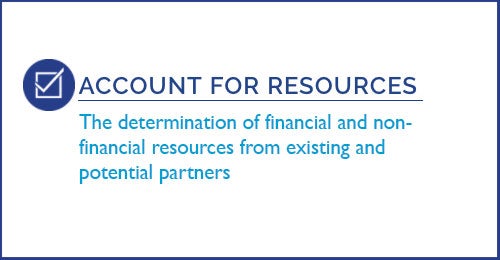Dec 08 2016 Diving Into The Intersector Toolkit: Account for Resources
 We recently updated our Toolkit for Intersector Collaboration to provide even more useful advice to practitioners involved in cross-sector collaborations. Each week we’ll be profiling one of our 17 tools, with a focus on resources that can help collaborations succeed.
We recently updated our Toolkit for Intersector Collaboration to provide even more useful advice to practitioners involved in cross-sector collaborations. Each week we’ll be profiling one of our 17 tools, with a focus on resources that can help collaborations succeed.
Determining the financial and non-financial resources of existing and potential partners allows partners to assess whether the collaboration has the resources to meet its goals. Account for Resources — the fourth tool in The Intersector Project Toolkit — is a process through which the collaboration develops a comprehensive picture of the financial and non-financial resources that all partners bring to the table; assesses any potential gaps in assets, networks, and expertise; and potentially engages additional partners to address those gaps. If a collaboration neglects to account for resources in its early stages, it exposes itself to higher operating risk and ultimately limits its capacity.
Partners may choose to collectively create a visual representation of resources that are accessible to the collaboration. The Partnering Toolbook, a comprehensive guide to partnering across sectors from The Partnering Initiative, provides discussion and a template to build a Resource Map, which helps partners identify the financial and non-financial resources, such as local knowledge, statistics, relationships with donors and media, and technical expertise, that they bring to the collaboration (found on pages 13-14). Creating a resource map has the potential to build teamwork, respect, and understanding among partners, and, as TPI notes, “in the spirit of gentle competition — it can lead [partners] to make tangible commitments that will enable the partnership to get underway more quickly and efficiently.”
Partners can use The Partnering Toolbook’s Partnering Roles and Skills Questionnaire (found on page 47) to assess which skills (such as negotiation, facilitation, and capacity-building) are present within the collaboration and which may need to be brought into the collaboration by engaging other partners or third party entities (e.g. facilitators).
Another tool for assessing and recording the assets, expertise, and networks available to the collaboration is a resource inventory. The Expertise and Resource Inventory, in the Collaboration Toolkit: How to Build, Fix, and Sustain Productive Partnerships, provides a template for identifying and documenting the expertise, contacts, and resources each partner brings to the collaboration and any next steps (found on pages 9-11 of Section 5). The Collaboration Toolkit was designed by the Office of Community Oriented Policing Services to help law enforcement and their partners build effective community policing partnerships but is accessible with minimal adaptation across a wide range of issues.
See Account for Resources in our Toolkit for further discussion on this topic, questions to guide tool use, and more.
Explore the full Toolkit and each of the 17 tools with enhanced discussion, questions to guide tool use, and additional resources here.
